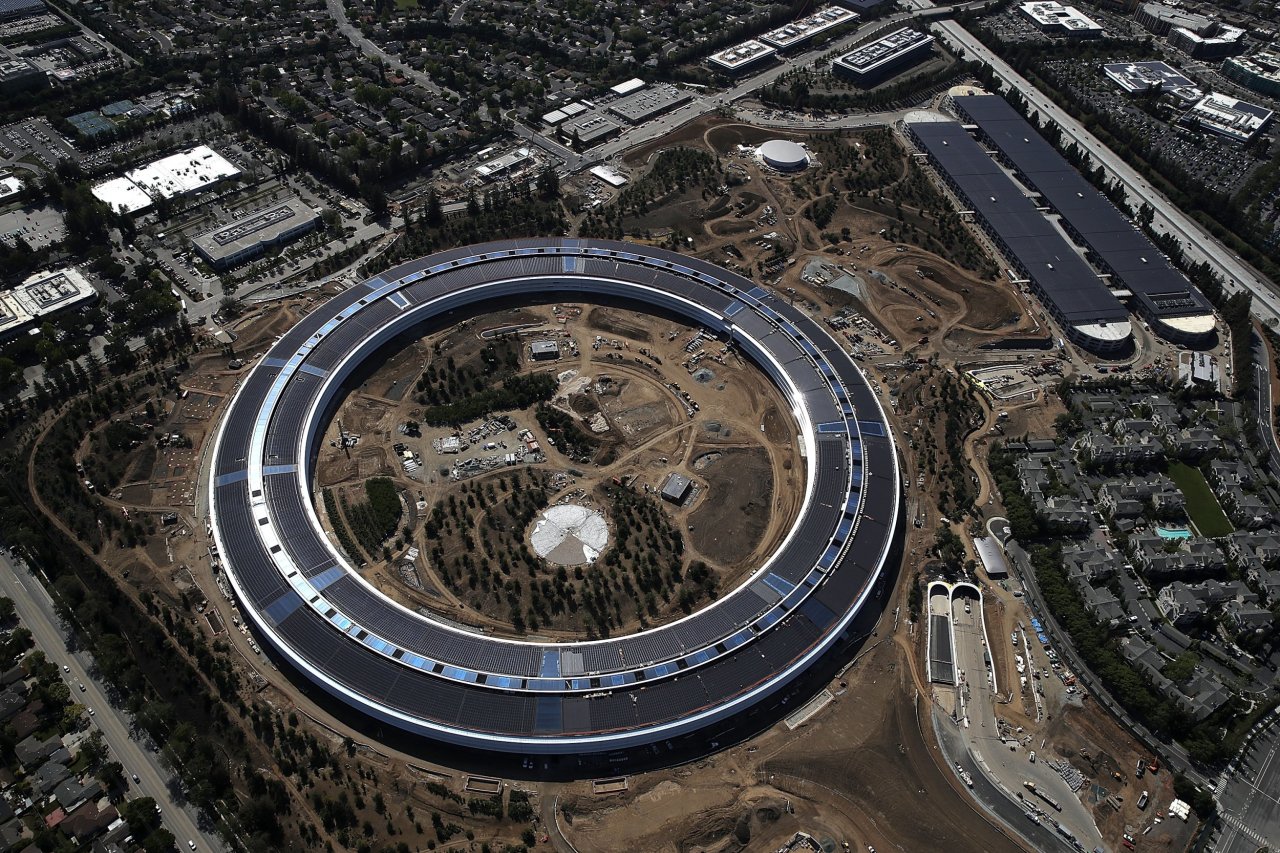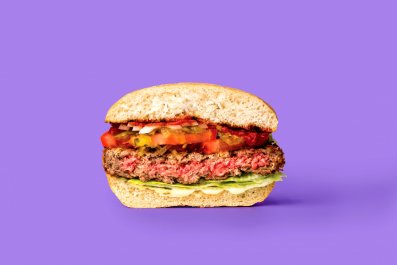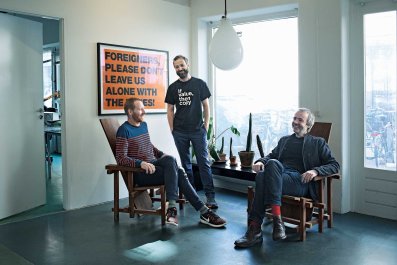Apple, Alphabet, Microsoft, Amazon and Facebook are the five most valuable U.S. companies, in that order. By 2025, it's a good bet at least one will no longer be on that list.
Which company will that be? Maybe the one starting to move into a $5 billion headquarters building that looks like a cross between a starship and a Bundt cake?
It's simplistic but fun to base Apple's prospects entirely on the Edifice complex, which dictates that a company's future success is inversely correlated to the grandiosity of its home office. A few years ago, super-investor Marc Andreessen published a list of 10 signs a company is ripe for a fall. No. 7: "Pouring huge money into overly glorious new headquarters." This principle is why no Sears employees are still in what used to be Chicago's Sears Tower.
But there is a more profound reason to believe Apple could be culled from the Big Five: data. Data, as pundits like to say, is the new oil. Companies with the most data will win.
Sucking Up Data
Data make a company's machine-learning software get smarter so that the company can better serve customers and vacuum up more market share. Think of Amazon's recommendation engine or the way the Google search algorithm constantly hones itself. As a company wins share, it pulls in yet more data, and the machine-learning software keeps getting smarter, further distancing the winning company from the also-rans. That spiral is why we've wound up with a handful of tech giants that boast a combined market value greater than the gross domestic product of the United Kingdom.
Related: How AI will cure America's sick health care system
The top five companies might appear to be in different businesses—hardware, search, software, retail, social media—but in fact they are competing fiercely against one another for one thing: data. Whenever you use any of their products or services, you are giving them data and making them smarter. So a primary factor in the future success of these companies is whether they can soak up more and new kinds of data about you and the world at large.
Alphabet, the second-most valuable company after Apple, operates a mind-boggling web of data-collecting services. It starts with Google's 90 percent share of search, which acts like the company's real-time ticker showing what the planet's population is interested in right now. (In May, Google Trends showed a sudden spike in searches for "Richard Nixon." Wonder why.) Add to that Google's Chrome browser, Gmail, Google Docs, YouTube, maps, calendars, photos and Android, which runs 80 percent of the world's smartphones and tracks a ton of data about each user. Alphabet is to data collection what a humpback whale is to krill.
Facebook knows a side of you that Google doesn't—your social interactions and, thus, a lot about your personality. It has about 2 billion active users globally, and that's not counting WhatsApp, Instagram and whatever the company will do with Oculus virtual reality. Facebook is also becoming the world's most powerful news service, so its software can learn about events and public sentiment from billions of clicks, likes and shares.
Amazon sucks up more data than any other company about consumer habits, while Amazon Web Services (AWS)—the cloud-computing juggernaut—gives Amazon a window on how data are being used by thousands of startups and big companies such as Netflix, which host their operations on AWS. Now Amazon is betting its Alexa gadgets can become our ever-present personal assistants in the cloud, gathering data about our lives along the way.
And Microsoft? Yeah, it's more boring than the others, but it's entrenched in the world's business operations with Windows, Office, server software and cloud computing. Corporations would grind to a halt without PowerPoint. Much of that software gives Microsoft ways to soak up more data about how we work than any competitor except maybe Google.
Can Apple Catch Up?
That brings us back to Apple. Yes, we love its hardware, and we will keep buying iPhones and MacBooks and iPads—though even Apple's hardware prowess is getting a little humdrum. The introduction of a new iPhone model used to generate goosebumps. Now the anticipation for the iPhone 8, to be unveiled in the fall, feels about on the level of excitement for a new model Chevy Camaro.
More important, Apple seems to be in a data-collection corner when competing against the other four giants. Its crown jewel—the iPhone and iOS—accounts for just 20 percent of smartphones, which means Google gets the data from the other 80 percent of smartphone users. Apple has no search, no social network, no significant online retail operation, no cloud services. All its productivity software ranks behind similar products from Microsoft and Google. Apple's Siri, once the star of commercials with John Malkovich, has fallen behind Alexa and Google's voice services in the race to be our digital assistants.
Related: Will AI robots turn humans into pets?
Meanwhile, Facebook, Google and Microsoft are investing heavily in virtual reality and seem to be well ahead of Apple. Even iTunes, which once funneled vast amounts of data about media habits to Apple, has turned into a technological laggard behind the likes of Netflix, Spotify, Amazon streaming services and Google's YouTube.
In just about every avenue for collecting data, Apple has been beaten. And because, in the era of machine learning, data relentlessly increases the gap between the winners and losers, it's hard to see how Apple can catch up to Alphabet, Amazon, Microsoft and Facebook.
Selling cool hardware that we all need will be a good business for a long time, just as selling cars or refrigerators can be a good business. But when it comes to inventing the data-driven, machine-learning future, four of the big five seem to be in a better position, while one is moving 12,000 employees into a steel-and-glass wheel that sports a 100,000-square-foot fitness center with a two-story yoga room that, as Wired reports, is "covered in stone, from just the right quarry in Kansas, that's been carefully distressed, like a pair of jeans, to make it look like the stone at [Steve] Jobs's favorite hotel in Yosemite."
Not every high-flying company tanks after building luxury digs, but it's happened enough that people notice. Silicon Graphics built a huge campus at its peak, then abandoned it to a rising Google in 2003. MySpace signed a 12-year lease worth $350 million in Los Angeles in 2008, as Facebook loomed on its horizon. AOL Time Warner started building a massive home in the middle of New York in 2000, just before the stock collapsed and the merger got labeled one of the worst deals ever.
Apple is packed with brilliant people who may surprise us with some wondrous new thing that leaves other companies far behind. It also has nearly $260 billion in cash—enough to buy General Electric, AT&T or Anheuser-Busch InBev. (Apple Beer!)
But it's just as likely that the new Apple campus will eventually seem like a monument to a great run that culminated in an $800 billion market cap the moment the moving vans pulled up out front.

















